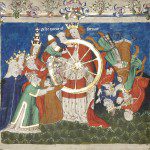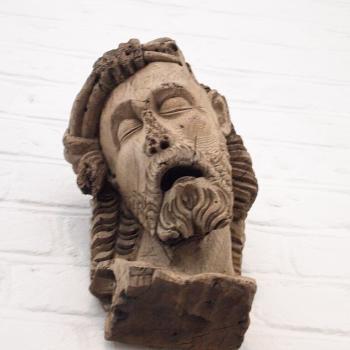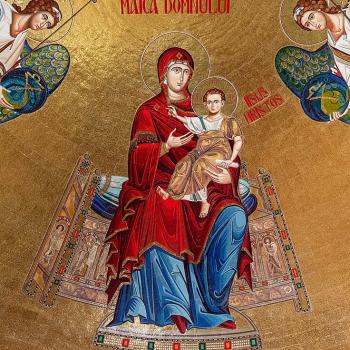![Mosaic depiction of Mary holding an Arabic text, Convent of Our Lady, Greek Orthodox Church, Sednaya, Syria. [Public domain], via Wikimedia Commons](https://wp-media.patheos.com/blogs/sites/637/2016/07/800px-Sednaya_Mary-300x286.jpg)
There are many ways we can answer these related questions; what will be provided here, as answers to them, should suffice, though clearly more could be said than what will be explained here. We will go from a basic answer, which will be sufficient for some, to a more complex and philosophically challenging one, for those who find themselves needing more than what a simple answer can provide.[2]
“Therefore, since we are surrounded by so great a cloud of witnesses, let us also lay aside every weight, and sin which clings so closely, and let us run with perseverance the race that is set before us, looking to Jesus the pioneer and perfecter of our faith, who for the joy that was set before him endured the cross, despising the shame, and is seated at the right hand of the throne of God” (Heb. 12:1-2 RSV). Scripture tells us that before us, watching us, is the cloud of witnesses, the saints.[3] They have gone before us, and yet surround us. How? Through the perfection they have attained by their acceptance and integration of God’s grace into their lives; as James said, “Every good endowment and every perfect gift is from above, coming down from the Father of lights with whom there is no variation or shadow due to change” (James 1:17 RSV).
The Holy Spirit has perfected the saints. They received many great gifts while on earth, but now, in death, they have entered eternal life and have received their heavenly reward.[4] What they once had on earth pales in comparison to the glory they have in heaven. On earth we are capable of being blessed by the Spirit who grants us great knowledge and wisdom, such as the knowledge of the spiritual gifts given to us, as Paul proclaimed, “Now we have received not the spirit of the world, but the Spirit which is from God, that we might understand the gifts bestowed on us by God” (1Cor. 2:13 RSV). The Spirit who gives us such wisdom while we are in our temporal existence is able to continue to give us and bestow upon us even greater and wisdom if we find ourselves glorified in Christ (cf. Rom 8:11-17).
Moreover, those who have fully given themselves to God, those who have become a part of that cloud of witnesses, find themselves perfected in Christ. They are transformed to be like him, and so, like him, they are full of love, a love which ties them not only to God, but to us, for love is what binds all things together (cf. Col. 3:14). And because God is a God of the living (cf. Mk 12:27), though they have died according to the flesh, they share in eternal life, and so they can be united with us in that love.
Therefore we should not marvel at the ability of the saints to work on our behalf. We know that while they lived, because of their close connection to Christ, they did a lot of great things for those around them. Now, in heaven, glorified by Christ, they can and do continue to work for us now. St. Thomas More showed how silly it would appear if this were not the case:
“You wonder,” said I, “if saints hear us, and you find it hard to believe that they do. And I – when you see that the things we pray for, we obtain – wonder much more how anyone can have any doubt as to whether the prayers are heard or not. When the saints were in this world at liberty, and could travel all over the world, do we think that in heaven they stand tied to a post?”[5]
Saint Thomas More suggested that it did not matter, at least for initial purposes, as to how the saints hear us, saying it is either from their own natural ability, or as a gift from God; the point is that they do, even as they continue to thrive in heaven because they have been enlivened by Christ.[6] That they can hear many of us at the same time should not surprise us, even as we can see and hear many things at the same time while on earth; what we can do now will only be enhanced as we find ourselves perfected by grace.[7]
If we are asked as to why we go to the saints, instead of relying upon God alone, St. Thomas More answered with an analogy. It is possible, he suggested, that we can be healed directly from God for some sort of ailment we have, but for the most part, God has left it up to doctors to be the indirect means by which he gives us such said. Similarly, we help each other out of many of life’s problems, recognizing that when we do, God is at work in and through such activity. We are called to beseech one another for help (cf. James 5:16). But, since the saints in heaven are united with us in the body of Christ, we can ask them for help, and we should not be surprised if God has decided they can then become be instruments by which he chooses to glorify himself in creation:
“So has it,” said I, “likewise pleased God that we shall ask help of his holy saints, and pray to them for healing. And this is not making them equal to God himself, even if they do it by his will and power, or he does it at their intercession. Though God will (as stands to reason) be chief and have no match, he yet does not forbid that one human being pray another for help. And though the Father has given all judgment to his Son [Jn 5:22], the Son yet does delight to have his holy saints be sharers in that honor, and on Judgment Day to have them sit with him [Mt 19:28]. Was Elisha made equal to God because the widow prayed him to revive her dead son? [See 2Kgs 4:28-35.] Were the apostles equal to Christ because they were prayed to for help after his death, and even during his life? [See Mt 10:1 and Acts 5:12-16.] And many things did they do at folk’s prayer. [8]
Moreover, if we rely upon what is said in Scripture, it indicates that the dead can have some knowledge of what is happening on the earth.[9] Even before the incarnation, when the saintly dead were awaiting the coming of Christ, we find they could be aware of what was taking place among the living. This is exactly what happened to Saul when he approached the Witch of Endor to talk to the dead prophet Samuel. While the means the witch used to get into contact with Samuel was sinful, she was able to do as he wished, and when Samuel responded, he showed knowledge of what was happening in Israel (cf. 1 Samuel 28:3-25). While some commentators have suggested that the witch did not bring up Samuel, but a demonic spirit pretending to be him, the book of Sirach tells us otherwise: “Even after he had fallen asleep he prophesied and revealed to the king his death, and lifted up his voice out of the earth in prophecy, to blot out the wickedness of the people” (Sir. 46:20 RSV).[10] Moreover, Samuel, even in the grave, continued to speak as a prophet, revealing the will of God. Thus, Origen rightfully asked, “Is a little demon capable of prophesying concerning the entire people of God that the Lord is about to deliver Israel?”[11] Despite the irreligious means Saul used to talk to Samuel, Samuel was the one who responded, and the dead are shown to have some awareness of what happens on the earth.[12]
More to come
[1] Those who object to Marian petitions point out that we are praying to her. Many, as a response, deny this claim. But why? What exactly is prayer? Traditionally, prayer meant to ask someone for something. Any form of petition can be said to be prayer. For this reason, the act of prayer does not have to be given to God alone because we ask each other for all kinds of things all the time. To be sure, this understanding of the word prayer has been lost to many, which is why the response of many is to deny we are praying to the saints, and say we only pray to God. They think prayer is a form of worship, and not just any kind of worship, but adoration, which is given to God alone. When this is what is being objected to, clearly we can understand why people deny we pray to Mary and the saints. But clearly prayer has other possibilities than this, by its own definition. Prayer as petition is fine and acceptable – indeed, it is a part of normal day to day life. When we find ourselves in trouble and in need, we ask others for help. Sometimes we get it, sometimes we do not. When we do, we often are (and should be) thankful, and we find some way to show the one who helped us that thanks. This, likewise, is how things go in relation to our petition of the saints. They can and do help us, and when they do, we are thankful for them. We do not think they are replacing God any more than we think our neighbor replaces God.
And so it is important to keep in mind that when we are asked about prayer to the saints to remind people that such prayer is all about petition – and to ask us even about such prayer is itself is form of prayer. We are not talking about the adoration which is due to God alone. We can and do petition God for help, but he has also made sure we live in society, where we work with and help each other. And if we help each other, we often have to ask each other for that help. In doing so, we are not placing people in the position of God, but rather, following the order which God had set up. When we talk about prayer to the saints, this is exactly what we are talking about: prayer to the saints is a form of petition, where we see them as a part of our overall spiritual community. We can, and usually will, give her and the saints honor in and with our petitions, showing our thankful hearts and deep respect, but, as we said before, is this not common with other forms of petition, when someone comes to help us out of a bind?
[2] And yet, to begin with, we must make a few points of clarification, so that what I say in response to these questions are properly understood, because, as is often the case, many of the words and concepts which I use are not often understood the same way by others. This will help make sure no equivocation and so misunderstanding occurs.
First, when talking about a soul, it must be understood that the soul is the life force, that which gives life to the body. In us, it is said to be a rational soul; that is, not only do we have life, but we have intellectual life. Not all forms of a soul are said to have such intellectual powers, for example, the soul or life force of plants is not capable of rational reflection, and so is not said to be a rational soul.
The soul is said to be spirit or spiritual, that is, it is not made of matter like our body.
The soul informs the body through the matter it takes in to make our body. It presses upon or directs the way our bodily characteristic are developed, so that in and through our body, there is a kind of image of the soul. As a result of sin, there is sometimes an imperfection in this development, but all such imperfections will be healed in the resurrection from the dead.
While the soul is said to be loosely spirit, and so we can say “soul” or “spirit” to mean one and the same thing, we could, if we want to be precise, distinguish the two, with the soul being the life force, and the spirit being the higher, intellectual capacities of the soul. Yet, because we are intellectual creatures, and we view ourselves and our life in relation to that intellectual life, we tend to use “soul” and “spirit” as equivalents, alternating our use of the words, not to indicate their precise philosophical meaning, but rather the simplified combination of the two—the “rational soul” which makes our spiritual makeup. The relationship between the life force (psyche, soul) and the intellectual aspect of our life (the nous) is an important distinction, but it is not necessary for us to go into detail here, so long as we recognize what we are doing with our conventions.
Finally, there is the relationship between universals and particulars. Universals can simply be said to be the essences of things as perceived by the intellect, while particulars are individual representations of those essences. Other aspects of the relationship between universals and their particulars, which emerges in philosophical debates, need not concern us here.
[3] In Hebrews 11, before these verses, the unknown author is exploring salvation history, giving many instances of holy people who lived and died for God. These are the ones the author considers to be the cloud of witnesses. The holy ones who lived and worked with God were believed to go to God, to be taken in by the God who is the God of the living, and so are to be said to be among the living, not the dead. What is argued here can and then should be taken forward, to see how any and all who follow God are then with the God of the living, have their repose in God and so continue to be alive in God and a part of this ever-increasing cloud of witnesses.
[4] There is, of course, two elements to that reward. There is the glory of a separated soul in heaven, then there is the glory of the resurrection in heaven. The first is a reward, but the second is a greater reward, and demonstrates the significance of the resurrection from the dead. The body is a part of who we are, and the fullness of our reward requires the fullness of who we are, for without the body, we lose aspects of who we are, including aspects of how we experience creation. Yet, as St. Thomas Aquinas rightfully pointed out, Scripture consistently says that when we die we shall experience the punishments and rewards for our life, not after waiting some time, but immediately. See St Thomas Aquinas, Summa Contra Gentiles. Book Four: Salvation. trans. Charles J. O’Neil (Notre Dame: University of Notre Dame Press, 1975), 334-8.
[5]St. Thomas More, Dialogue Concerning Heresies. ed. Mary Gottschalk (New York: Scepter Publishers, 2006), 245.
[6] See ibid., 245.
[7] See ibid., 245-6. St. Thomas More’s arguments are even more effective today, as we can see and encounter many people, all over the world at the same time, through natural means: the internet. If we can achieve that through earthly means, we should not be surprised if we can achieve something even greater in heaven.
[8] Ibid., 247.
[9] Despite what some might suggest, the saints do not have to know everything happening in creation to know what directly relates to them. We shall look at this more later; the point is that their knowledge of what is happening on the earth, while different, and in some ways greater than our knowledge, still can be limited and yet contain all that they need to know to know they are being addressed and how they should respond to any petition they receive.
[10] Both of these references go a long way in establishing the fact that Israel had some notion of an afterlife: death was not mere annihilation. What, exactly, happened after death was as shadowy a subject as the dead themselves were to the living, and certainly there were a wide variety of views which slowly worked together to allow for the full Christian understanding which comes as a result of Christ’s victory over death.
[11] Origen, “Homily on I Kings 28” in Origen: Homilies on Jeremiah; Homilies on 1 King 28. trans. John Clark Smith (Washington, DC: CUA Press, 1998), 324.
[12] The problem with the witch is the way she engaged Samuel, through various unseemly magical rites; when someone suggests prayer to the saints is the same, they unjustly equivocate necromancy with the holy intercession of the saints, ignoring especially what Christ said about eternal life and how God is a God of the living, not the dead.
Stay in touch! Like A Little Bit of Nothing on Facebook:
A Little Bit of Nothing












